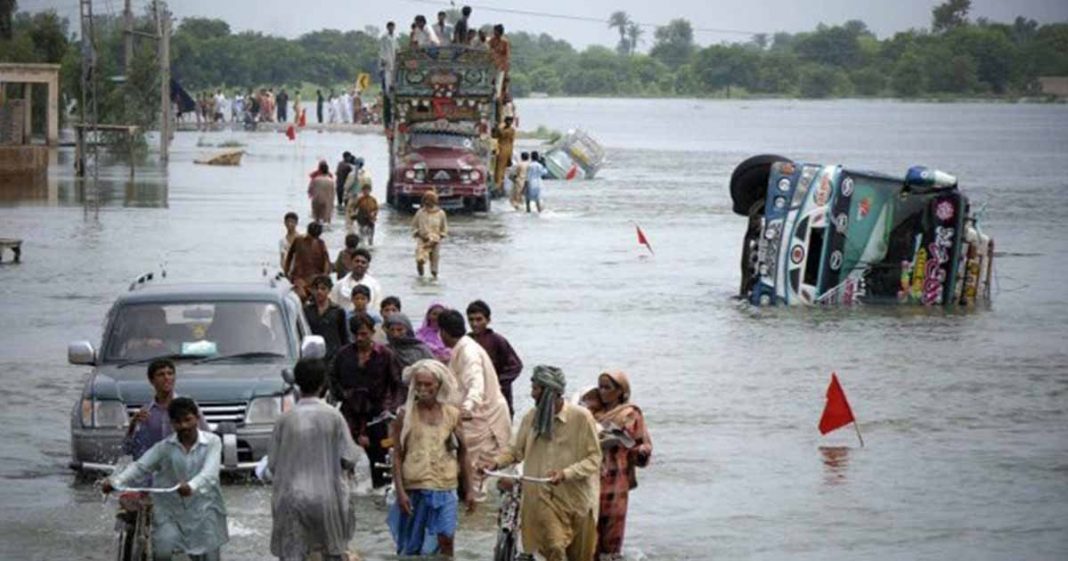The climate crisis is a looming threat and a cause of concern all across the world. From the well-developed global north to the underdeveloped global south, states whether large or small, well-fed or underfed, politically/economically stable or politically/economically weak all are under the same umbrella, sooner or later they might be facing climate’s wrath.
It has been argued time and again by climate change activists that glaciers across Europe and in America are melting due to increasing global temperatures, it was however considered a bluff by prominent world leaders. Former United States president Donald Trump called climate change a hoax invented by China and promised to take the United States out of the Paris climate change agreement.
Read more: Mitigating the climate change conundrum
Climate change deepens the crisis in Pakistan
However, some other leaders are headstrong supporters of global warming and want to take effective measures to tackle it. For instance, the incumbent French president Immanuel Macron has called emergency meetings of the group of 7 leaders several times to discuss the climate crisis.
This year, the highest temperatures were recorded in the summer session in Pakistan, mercury in several central regions crossed a hovering 50 degrees celsius. Similarly, the northern areas suffered extreme ice melts and glacial outbursts resulting in casualties and destruction of property. The monsoon session was followed by unexpected spells of rain that caused unprecedented damage to crops, property and livestock while killing over 900 people in different cities.
This episode has created serious problems for Pakistan in terms of food security; Pakistan is already facing severe economic distress as well as political chaos. Recently it became dependent on imported grain as its local production was not able to fulfill the needs of its populace. In face of these problems, the country’s population has been starkly increasing every year putting an extra burden on the economy. It has been speculated that the country might face absolute water scarcity by 2025 while food insecurity would rise from 40% to 60% by 2050.
Read more: Climate Change and its subsequent sociopolitical unrest
Pakistan seems ill-equipped with tackling these challenges
The country has ranked amongst the most polluted countries and faced the highest projected annual economic loss to GDP (9.1%) in Asia.
A report published in mid-2021 by the UN’s Intergovernmental Panel on Climate Change (IPCC) cautioned that the consequences of the current global warming are irreversible. One of the more sobering findings of the report is that polar and mountain glaciers are likely going to continue to melt, irreversibly, for decades or centuries to come, and this is where Pakistan comes into the equation as it has more glaciers outside of the polar ice caps than anywhere on earth.
The glaciers feed one of the oldest and most fertile valleys on the planet – that of the Indus Basin, split between India and Pakistan. Roughly 75 percent of Pakistan’s 216 million population is settled on the banks of the Indus River. Most of its urban cities rely on the Indus River for commercial and domestic purposes. Now if the report by IPCC is correct Pakistan will surely be short of water by 2050.
With soaring temperatures there will be more glaciers melting and consequently more floods, displacing thousands, and destroying crops and infrastructure. Pakistan will be one of the most hard-hit countries by global warming if swift action is not taken on time.
Read more: Recurring heat waves and Pakistan’s climate change dilemma
One of the biggest contributors to global warming is carbon dioxide emission, as a remedy of which the industrialized world is talking about green energy and less reliance on burning fossil fuels for energy purposes, they can somehow achieve this target as they have the resources and the structural blueprints for green energy production, the case with the developing world in particular with Pakistan is quite different, the shift to renewable energy will require many industries to cut off on production which means a decline in their annual profit.
What should be done?
The country’s wealth is primarily concentrated in the hands of these few industrialists and the government is partially reliant on their taxes. Another reason for industrialists’ unwillingness to shift to renewable energy to meet their production goals is the massive amount of investment the renewable sector usually requires. Investment in green technology requires a lot of funds, which very few are willing to provide.
It’s time for the underdeveloped south to cut loose on false promises provided by the developed countries and form a regional organization solely aimed at combating climate emergencies. If The South Asian Association for Regional Cooperation (SAARC) can provide the platform, let it be. Countries from SAARC need to devise strategies to limit their carbon emissions and work together for green energy initiatives. The organization should engage vulnerable communities on a priority basis to mitigate climate calamities.
Read more: Climate change: India and Pakistan’s biggest threat?
Furthermore, the climate crisis is the sole problem that the entire world is facing simultaneously. Multilateral cooperation and not competition is the need of time.
The writer is working as a freelance content creator. The views expressed by the writers do not necessarily represent Global Village Space’s editorial policy.














